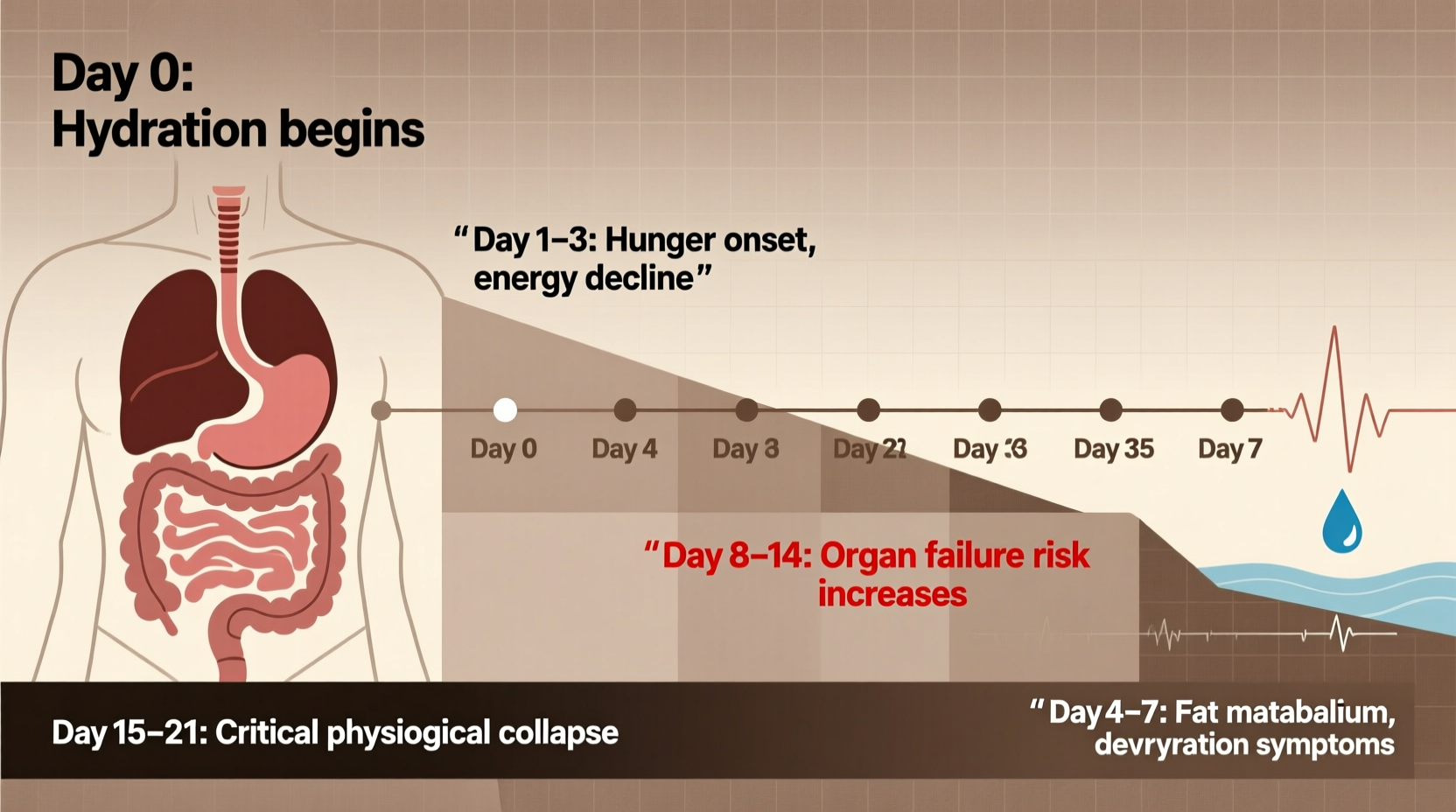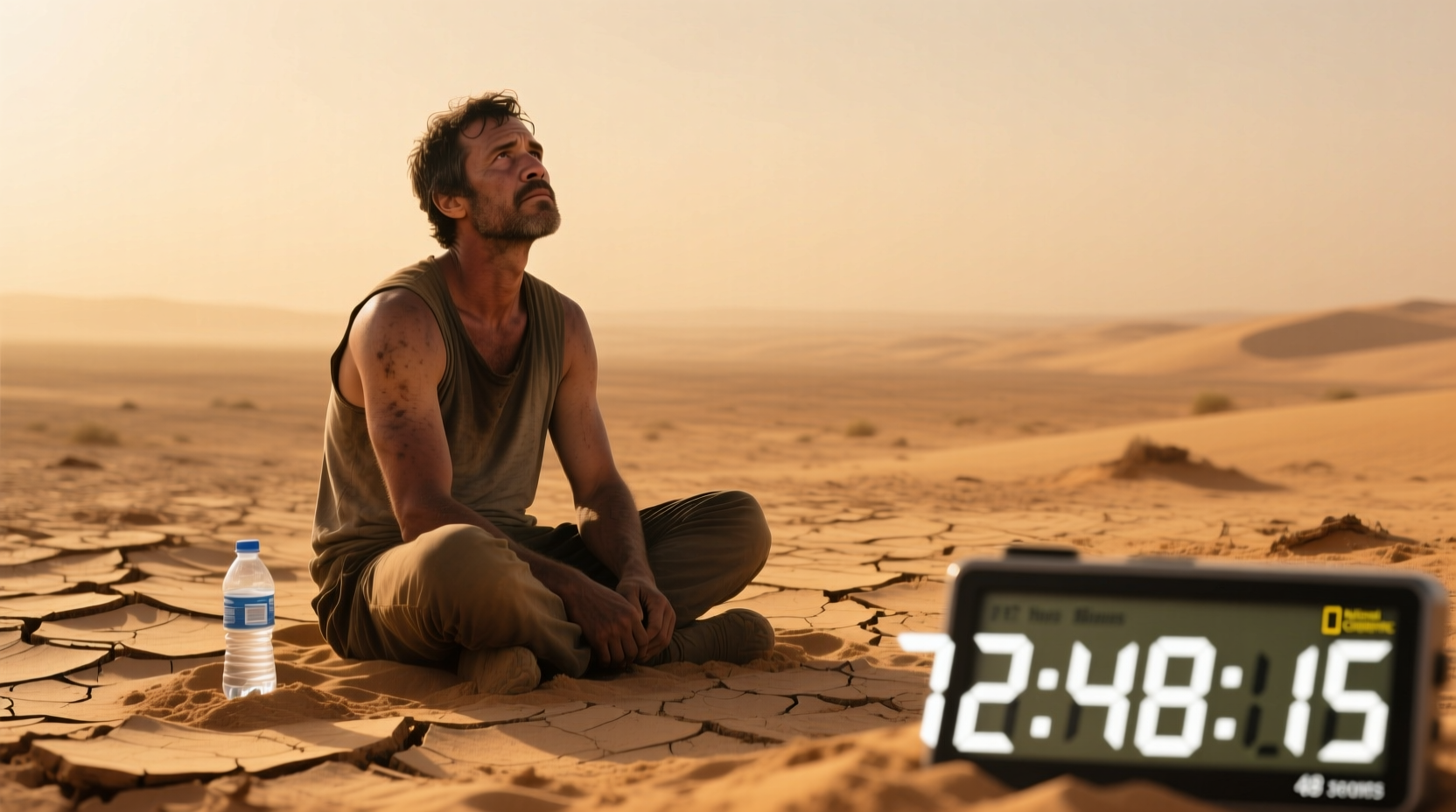Based on medical research, humans typically survive 3-4 days without water and 3-8 weeks without food under average conditions. These timelines vary significantly based on temperature, health status, activity level, and individual physiology. Water deprivation becomes critical much faster than food deprivation due to the body's constant need for hydration.
Understanding Human Survival Limits: The Science Behind Food and Water Deprivation
When emergency situations arise, knowing your body's true limits can mean the difference between life and death. This guide provides medically-verified information about human survival without sustenance, helping you make informed decisions during critical moments. You'll learn not just the numbers, but the physiological processes, warning signs, and variables that dramatically affect these timelines.
Water Deprivation: The 72-Hour Critical Window
Water constitutes about 60% of your body weight and is essential for nearly every bodily function. Without it, your systems begin failing within hours. The commonly cited "three-day rule" represents an average under moderate conditions, but reality is far more nuanced.
Within the first 24 hours of water deprivation, you'll experience thirst, dry mouth, and reduced urine output. By 48 hours, symptoms escalate to dizziness, headache, and rapid heartbeat. After 72 hours, organ failure begins as your body prioritizes vital functions. The Mayo Clinic reports that severe dehydration can cause kidney failure, seizures, and unconsciousness within this timeframe.
| Time Without Water | Physiological Changes | Warning Signs |
|---|---|---|
| 0-24 hours | 1-2% dehydration; reduced blood volume | Thirst, dry mouth, decreased urine |
| 24-48 hours | 3-5% dehydration; increased heart rate | Dizziness, headache, muscle cramps |
| 48-72 hours | 6-10% dehydration; organ stress | Rapid pulse, confusion, minimal urine |
| 72+ hours | 10%+ dehydration; organ failure | Seizures, unconsciousness, death |
Food Deprivation: Understanding the Body's Energy Reserves
Unlike water, food deprivation follows a more extended timeline as your body taps into energy reserves. The average person can survive 3-8 weeks without food, depending on body fat percentage, overall health, and environmental conditions. The CDC notes that individuals with higher body fat may survive longer as the body metabolizes stored fat for energy.
Your body enters ketosis within 24-48 hours, switching from glucose to fat metabolism. After glycogen stores deplete, protein breakdown begins, affecting muscle mass including heart tissue. Research published in the Journal of Emergency Medicine shows that severe malnutrition typically becomes critical after 30-40 days, with cardiac complications becoming the primary cause of death.
Key Factors That Dramatically Alter Survival Timelines
Survival isn't just about time—it's about conditions. Several critical variables can shorten or extend your window significantly:
- Temperature: In hot environments (above 90°F/32°C), water loss accelerates, potentially reducing survival time to 24-36 hours. Cold environments below freezing can extend food deprivation survival by reducing metabolic demands.
- Physical Activity: Vigorous movement increases water needs by 50-100%. Resting conserves both water and energy reserves.
- Health Status: Pre-existing conditions like diabetes or kidney disease dramatically reduce water tolerance. The National Institutes of Health reports that individuals with compromised health may survive half as long as healthy counterparts.
- Acclimatization: People adapted to arid environments through gradual exposure can survive longer due to physiological adaptations like reduced sweat production.
Recognizing Critical Warning Signs
Knowing the progression of symptoms helps you identify when intervention is urgent:
Dehydration progression: Thirst → dry mouth → dark urine → dizziness → rapid heartbeat → confusion → unconsciousness. The American Heart Association emphasizes that confusion indicates severe dehydration requiring immediate attention.
Starvation progression: Hunger → fatigue → dizziness → muscle weakness → irregular heartbeat → organ failure. The World Health Organization identifies significant weight loss (more than 10% of body weight in 30 days) as a critical warning sign.

Practical Emergency Guidance: Maximizing Your Survival Window
When facing potential deprivation situations, these evidence-based strategies can extend your survival time:
- Conserve energy: Limit movement to reduce water and calorie expenditure. The CDC recommends staying in shaded areas during daylight hours in hot environments.
- Monitor urine color: Pale yellow indicates adequate hydration; dark yellow or amber signals dehydration. This simple visual cue provides immediate feedback on your status.
- Manage expectations: The Wilderness Medical Society advises that psychological preparation significantly impacts survival outcomes. Understanding what to expect reduces panic and conserves energy.
- Seek alternative moisture: In wilderness situations, morning dew collection or solar stills can provide minimal water. However, the Journal of Wilderness and Environmental Medicine cautions against consuming unsafe water sources without purification.
When Medical Intervention Becomes Critical
Refeeding syndrome represents a serious risk when reintroducing food after prolonged deprivation. The American Journal of Clinical Nutrition reports that sudden food intake after 10+ days without food can cause fatal electrolyte imbalances. Similarly, rapid rehydration after severe dehydration can lead to hyponatremia. Medical supervision is essential when recovery begins.
Myth vs. Reality: Common Misconceptions About Survival
Numerous survival myths persist that could prove dangerous in real situations:
- Myth: You can survive indefinitely on minimal water by reducing activity. Reality: Even at complete rest, water loss continues through respiration and minimal perspiration. The body requires approximately 0.5-1 liter daily for basic functions.
- Myth: Eating snow provides adequate hydration in cold environments. Reality: Consuming snow lowers body temperature, increasing energy expenditure. The Wilderness Medical Society recommends melting snow before consumption.
- Myth: The body can survive longer without food than water under all conditions. Reality: In extreme heat (above 100°F/38°C), water becomes critical within 24 hours while food deprivation remains manageable for days.
Practical Preparedness: Building Your Emergency Plan
Understanding survival limits informs practical preparedness strategies:
- Maintain a 3-day emergency water supply (1 gallon per person per day)
- Include high-calorie, non-perishable food in emergency kits
- Learn basic water purification methods
- Understand your personal health factors that might affect survival time
- Carry electrolyte replacement solutions for extended dehydration risks
Frequently Asked Questions
How long can a healthy adult survive without water in moderate temperatures?
Most healthy adults survive 3-4 days without water in moderate temperatures (60-80°F/15-27°C). This timeframe shortens significantly in hot environments and extends slightly in cold conditions. Individual factors like body size, health status, and activity level create substantial variation in these timelines.
Can you survive longer without food than without water?
Yes, generally you can survive much longer without food than without water. While water deprivation becomes critical within days, most people can survive 3-8 weeks without food. However, this depends heavily on body fat reserves, overall health, and environmental conditions. In extreme heat, water becomes the more immediate concern.
What are the first signs of severe dehydration?
The first critical signs of severe dehydration include dark urine, dizziness, rapid heartbeat, and extreme thirst. As dehydration progresses, symptoms escalate to confusion, fainting, and significantly reduced urine output. The American Heart Association considers confusion a medical emergency requiring immediate intervention.
Does body weight affect survival time without food?
Yes, body weight significantly impacts survival time without food. Individuals with higher body fat percentages generally survive longer as the body metabolizes stored fat for energy. However, overall health status often outweighs this factor—someone with 20% body fat but underlying health conditions may survive less time than a lean but healthy individual.
What should you do immediately when realizing you're without water?
When facing water shortage, immediately stop physical activity, find shade, and minimize sweating. Monitor urine color as a hydration indicator. Begin searching for water sources while conserving energy. The CDC recommends prioritizing water finding over food gathering in survival situations due to water's more critical timeline.











 浙公网安备
33010002000092号
浙公网安备
33010002000092号 浙B2-20120091-4
浙B2-20120091-4